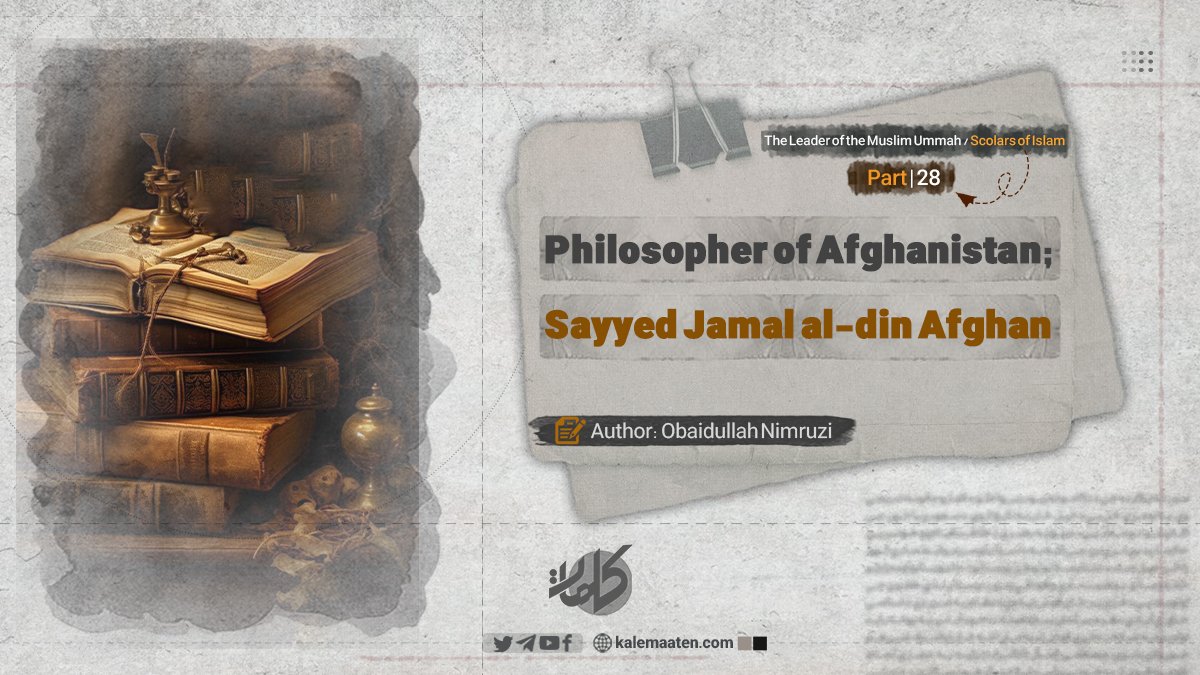Author: Obaidullah Nimruzi
Philosopher of Afghanistan; Sayyed Jamal al-din Afghan (Part 28)
Promoting Awakening Thoughts and Nationalism
At the beginning of Sayyed Jamal al-din’s stay in Egypt, his ideas were mainly focused on spirituality and cultural reform and did not directly target politics. He acted as a teacher and social reformer, striving to raise public awareness. However, with the increasing influence of foreigners and the peak of the economic crisis in 1876, his thoughts took on a more revolutionary tone. At this stage, he directly criticized European interference in Egypt and warned the people that financial and political dependence on the West would lead the country into colonialism.
Sayyed Jamal al-din and the Challenges of Ismail Pasha’s Rule
Contrary to popular belief, Sayyed Jamal al-din initially had no direct hostility toward Ismail Pasha. Rather than opposing the Egyptian government itself, he stood against foreign influence. Over time, however, as the economic crisis deepened and European powers further interfered in Egypt’s internal affairs, his ideas began to indirectly challenge the regime as well. He taught the people that the government should not consider itself the absolute owner of the nation, and that the citizens must be aware of their rights. This idea shook the foundations of absolute monarchy and paved the way for new political movements.
Conclusion: From Economic Dependence to National Awakening
As described by Muhammad Abduh, one of Sayyed Jamal al-din’s prominent students, Egypt at the time was in a critical condition. The people believed that their prosperity or misery depended solely on the king’s will and that they had no rights before the government. However, Sayyed Jamal al-din’s ideas changed that belief. He taught the people that the king and the state were not absolute owners of the country and that the nation must stand for its rights.
This intellectual transformation sparked a movement that later continued through Egypt’s anti-colonial and nationalist efforts. Although Ismail Pasha’s government eventually fell and colonial forces gradually expanded their domination, the seeds planted by Sayyed Jamal al-din in that era became a vital force in the political and intellectual awakening of the Islamic world.
Public Awareness and Awakening Against Tyrannical Rulers
The people were largely ignorant of the relationship between themselves and their rulers. They only knew that they were condemned to follow the commands and prohibitions of the ruling classes. No one dared to speak freely or address issues regarding the management of the country or reforming the nation. If anyone dared to voice such thoughts, they would be exiled or executed, and their property confiscated. That changed when Jamal al-din arrived in Egypt, and various groups from different social classes became acquainted with him. At that moment, a sense of responsibility was instilled in the veins and arteries of the people, thoughts were awakened, and the veils of ignorance were lifted from their hearts and minds.
The Impact of Sayyed Jamal al-din Afghan on Islamic Awakening
This view is not exclusive to Imam Muhammad Abduh but is shared by many who have discussed Sayyed Jamal al-din Afghan. They unanimously agree that his arrival in Egypt, the gathering of seekers of knowledge from various classes around him, and his reformist call in Islamic countries brought harmony and unity between the principles of Islam and the foundations of science and society. The achievements of this movement laid the groundwork for rational planning of human life and for organizing the affairs of Arab and other Near Eastern countries, promoting the ideas of freedom and reform—ideas that continue to grow and evolve. This movement aims to free these nations from colonialism and autocracy, elevating them to great levels of civilization and progress.
Sayyed Jamal al-din’s Role in Egypt’s Intellectual Transformation
Western scholars also share similar views with Eastern researchers regarding Sayyed Jamal al-din’s role. George Kirk, discussing this historical period in Egypt, states that for the past fifty years, Egypt had been influenced by Europe, and its education system was modeled after Europe—albeit in form, not in essence. This led to the emergence of a small group of modernist youth known as the “Effendi” class, who had studied the liberal ideas circulating in Western Europe. Sayyed Jamal al-din had a profound impact on awakening the spirit of freedom among these young people. He was a reformist caller who aspired to liberate all Islamic countries from European colonialism and the exploitation of their wealth. He wished to unite these countries under a single Islamic caliphate.
The Impact of Ismail’s Reforms and Public Reaction
Sayyed Jamal al-din Afghan arrived in Egypt from exile in 1871 and spent eight years there preaching and advocating reform. Although Ismail’s programs in public affairs improved state relations and supported production and trade, the general public did not benefit much. In 1875, the common people—already bearing heavy tax burdens—paid five times more tax than they did in 1861. This situation fueled public pessimism and sparked anger and resentment against Ismail’s policies. These factors combined, leading the people to rise against the ruling elite and rebel against Ismail.
Change in Egyptian Literature and Culture under Sayyed Jamal al-din’s Influence
Professor Ahmad Amin, in reference to Sayyed Jamal al-din’s stay in Egypt and the impact of his ideas on literary and cultural transformation, says that Egyptian literature had been under the control of aristocrats and focused solely on praising kings and the powerful. Literature served as entertainment for rulers, and no one dared to speak against tyranny or corruption. At that time, rulers were never held accountable for their actions, public wealth was plundered, and those who squandered this wealth were praised. But Sayyed Jamal al-din turned literature into a tool for serving the people and defending their rights. He raised awareness, condemned oppression, and called on people to move from darkness into light.
The Song of Freedom and People’s Rights
Sayyed Jamal al-din called on the people not to fear punishment from their rulers and to understand that their rulers’ power came from the people themselves. He aimed to restore the trampled rights and lost prosperity of the people. As a result, Egyptian literature adopted a new form. Writers shifted from praising rulers to defending people’s rights and discussing the responsibilities of leaders and the rights of citizens. This was a new song that Muslims began to hear in the post-despotism era.
New Thought and Sayyed Jamal al-din’s Educational Philosophy
Ahmad Amin speaks of the innovative and fresh thought that Sayyed Jamal al-din’s students found in him, which they believed in and implemented. He analyzes this innovation and outlines its key features. In my view, the most important characteristic of this innovation is its effort to link all scientific and practical aspects of life to a central axis. These various elements not only support one another but also align toward a single goal, achieving coherence.
Within such a perspective, imagining a philosophical life in which public and private aspects are independent of each other is impossible. Rather, these aspects must interact and form a harmonious unity. When this goal is achieved, a person gains a realistic vision, freeing themselves from painful doubts and intellectual confusion. With this mindset, they develop the ability to distinguish right from wrong and to derive benefit from harmful experiences, knowing what to do and what to avoid. This realistic outlook acts like a lamp that illuminates the path of life.
Sayyed Jamal al-din’s Educational Method in Egypt
Based on this deep insight and understanding of interaction between different elements, Sayyed Jamal al-din educated his students in Egypt. He employed every available means to spread his teachings and held regular study sessions at his home. These gatherings attracted university students as well as prominent scholars.
In these sessions, Sayyed Jamal al-din would read texts from jurisprudence or philosophy and interpret and explain his thoughts in their light. He used this method to propagate his literary and political ideas and would sometimes deliver lectures on key and essential topics.
Muhammad Abduh has conveyed two significant lessons from Sayyed Jamal al-din—one on education and upbringing, and the other on industry.
Lesson One: Balance in Life’s System and Human Development
In his first lesson, Sayyed Jamal al-din explains that the sustainability of life in living beings depends on the proportional interaction of their internal elements. No single element should dominate the others to the point of nullifying their functions. If this happens, the natural balance of the body is disrupted, resulting in disease.
The same rule applies to human perfection. Human excellence is achieved when opposing moral traits coexist, and through their interaction, balance and virtue emerge. If one trait dominates the rest, the system of virtue collapses, paving the way for the dominance of vice.
For example, the human soul must possess both courage and fear. Though these traits appear contradictory, each must be used appropriately. Only then can the trait of bravery develop in a balanced manner.
Continues…
Previous Part/ Next Part
References
[1] Biography of Jamal al-din Afghan, Faiz al-Khatir, Vol. 5, Cairo: Committee for Authorship, Translation, and Publishing Press, 1943, pp. 243-300.
[2] Muhammad Rashid Rida, History of Al-Ustadh Al-Imam, Vol. 2, Al-Manar Press, Egypt, 1931, p. 2.



